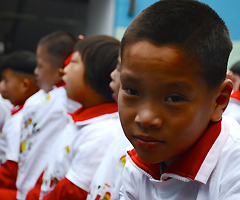Pengcheng Special Education School: profile of compassion
By Chen Bei (chinadaily.com.cn) Updated: 2014-10-14 11:40
It is a sunny autumn morning in Xuzhou and Doreen Chin-Huang is crossing the former Jiangsu province coal city in a taxi after spending more than seven hours on a train from Beijing.
|
Dreams and realities about China's special education
 It is a sunny autumn morning in Xuzhou and Doreen Chin-Huang is crossing the former Jiangsu province coal city in a taxi after spending more than seven hours on a train from Beijing. Her destination is Pengcheng Special Education School, the city's only private school for students with intellectual disabilities. |
The former UNESCO officer, who has helped establish dozens of schools across rural China, knows this journey to East China very well. Since 2001, she has made the trip countless times in order to help raise funds and awareness for the three-storey school and its present enrollment of 135 students.
"I am trying to help more children with special needs get access to basic education by building a multi-channeled charity network of various private and public sectors," said Chin-Huang.
"I feel comfortable marketing this project because we are not out to make money but to promote more public awareness of children with intellectual disabilities."
Still, Chin-Huang admits fundraising is an extremely difficult and time-consuming task.
"Pengcheng Special Education School is always financially strained, although it has received numerous donations from dozens of organizations at home and abroad," she said.
The school requires more than 1.5 million yuan ($244,000) each year to keep its doors open, according to Chin-Huang. "We have no constant source of incomes except students' tuition, and that is far from enough to pay for the operational costs of a school with 135 students and 32 teachers."
The school charges each child 1,500 yuan ($245) per semester plus 2,300 yuan for board and lodging. At least 30 students from poor families have their tuition paid by charitable contributions.
Donations are also used to cover students' uniforms, computers, rehabilitation facilities, wall paintings, rubber flooring and teacher training in special education skills, according to Chin-Huang.
In recent years the Chinese government has bolstered its financial support for special education. The annual educational budget for each disabled student will reach 4,000 yuan in 2014 and rise to 6,000 yuan ($990) by 2016, according to a national three-year plan on special education improvement issued earlier this year.
- Govt encourages people to work 4.5 days a week
- Action to be taken as HIV cases among students rise
- Debate grows over reproductive rights
- Country's first bishop ordained in 3 years
- China builds Tibetan Buddhism academy in Chengdu
- Authorities require reporting of HIV infections at schools
- Typhoon Soudelor kills 14 in East China
- Police crack down on overseas gambling site
- Debate over death penalty for child traffickers goes on
- Beijing to tighten mail security for war anniversary








